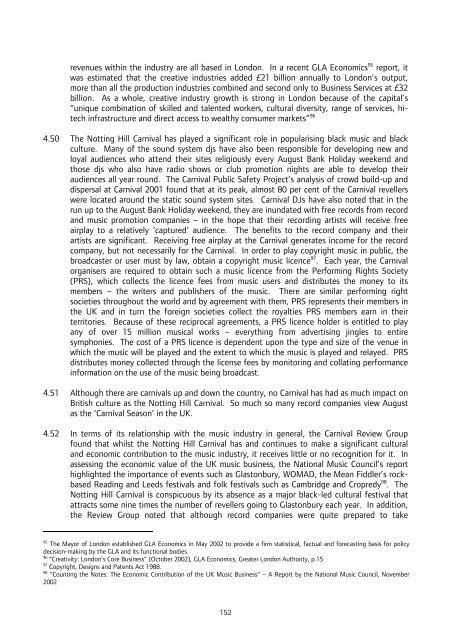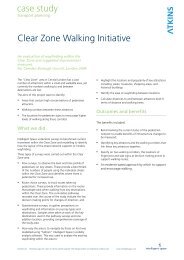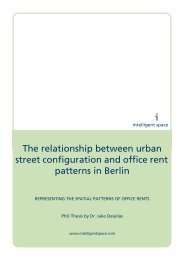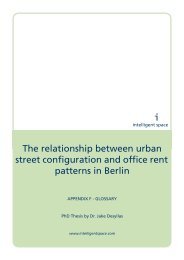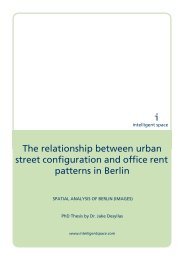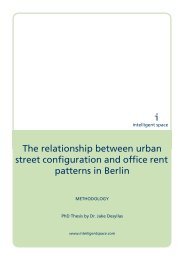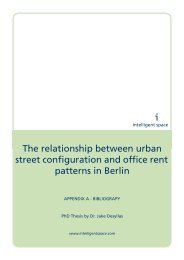Notting Hill Carnival Strategic Review - Intelligent Space
Notting Hill Carnival Strategic Review - Intelligent Space
Notting Hill Carnival Strategic Review - Intelligent Space
Create successful ePaper yourself
Turn your PDF publications into a flip-book with our unique Google optimized e-Paper software.
evenues within the industry are all based in London. In a recent GLA Economics 95 report, it<br />
was estimated that the creative industries added £21 billion annually to London’s output,<br />
more than all the production industries combined and second only to Business Services at £32<br />
billion. As a whole, creative industry growth is strong in London because of the capital’s<br />
“unique combination of skilled and talented workers, cultural diversity, range of services, hitech<br />
infrastructure and direct access to wealthy consumer markets” 96<br />
4.50 The <strong>Notting</strong> <strong>Hill</strong> <strong>Carnival</strong> has played a significant role in popularising black music and black<br />
culture. Many of the sound system djs have also been responsible for developing new and<br />
loyal audiences who attend their sites religiously every August Bank Holiday weekend and<br />
those djs who also have radio shows or club promotion nights are able to develop their<br />
audiences all year round. The <strong>Carnival</strong> Public Safety Project’s analysis of crowd build-up and<br />
dispersal at <strong>Carnival</strong> 2001 found that at its peak, almost 80 per cent of the <strong>Carnival</strong> revellers<br />
were located around the static sound system sites. <strong>Carnival</strong> DJs have also noted that in the<br />
run up to the August Bank Holiday weekend, they are inundated with free records from record<br />
and music promotion companies – in the hope that their recording artists will receive free<br />
airplay to a relatively ‘captured’ audience. The benefits to the record company and their<br />
artists are significant. Receiving free airplay at the <strong>Carnival</strong> generates income for the record<br />
company, but not necessarily for the <strong>Carnival</strong>. In order to play copyright music in public, the<br />
broadcaster or user must by law, obtain a copyright music licence 97 . Each year, the <strong>Carnival</strong><br />
organisers are required to obtain such a music licence from the Performing Rights Society<br />
(PRS), which collects the licence fees from music users and distributes the money to its<br />
members – the writers and publishers of the music. There are similar performing right<br />
societies throughout the world and by agreement with them, PRS represents their members in<br />
the UK and in turn the foreign societies collect the royalties PRS members earn in their<br />
territories. Because of these reciprocal agreements, a PRS licence holder is entitled to play<br />
any of over 15 million musical works – everything from advertising jingles to entire<br />
symphonies. The cost of a PRS licence is dependent upon the type and size of the venue in<br />
which the music will be played and the extent to which the music is played and relayed. PRS<br />
distributes money collected through the license fees by monitoring and collating performance<br />
information on the use of the music being broadcast.<br />
4.51 Although there are carnivals up and down the country, no <strong>Carnival</strong> has had as much impact on<br />
British culture as the <strong>Notting</strong> <strong>Hill</strong> <strong>Carnival</strong>. So much so many record companies view August<br />
as the ‘<strong>Carnival</strong> Season’ in the UK.<br />
4.52 In terms of its relationship with the music industry in general, the <strong>Carnival</strong> <strong>Review</strong> Group<br />
found that whilst the <strong>Notting</strong> <strong>Hill</strong> <strong>Carnival</strong> has and continues to make a significant cultural<br />
and economic contribution to the music industry, it receives little or no recognition for it. In<br />
assessing the economic value of the UK music business, the National Music Council’s report<br />
highlighted the importance of events such as Glastonbury, WOMAD, the Mean Fiddler’s rockbased<br />
Reading and Leeds festivals and folk festivals such as Cambridge and Cropredy 98 . The<br />
<strong>Notting</strong> <strong>Hill</strong> <strong>Carnival</strong> is conspicuous by its absence as a major black-led cultural festival that<br />
attracts some nine times the number of revellers going to Glastonbury each year. In addition,<br />
the <strong>Review</strong> Group noted that although record companies were quite prepared to take<br />
95<br />
The Mayor of London established GLA Economics in May 2002 to provide a firm statistical, factual and forecasting basis for policy<br />
decision-making by the GLA and its functional bodies.<br />
96<br />
“Creativity: London’s Core Business” (October 2002), GLA Economics, Greater London Authority, p.15<br />
97<br />
Copyright, Designs and Patents Act 1988.<br />
98<br />
“Counting the Notes: The Economic Contribution of the UK Music Business” – A Report by the National Music Council, November<br />
2002<br />
152


